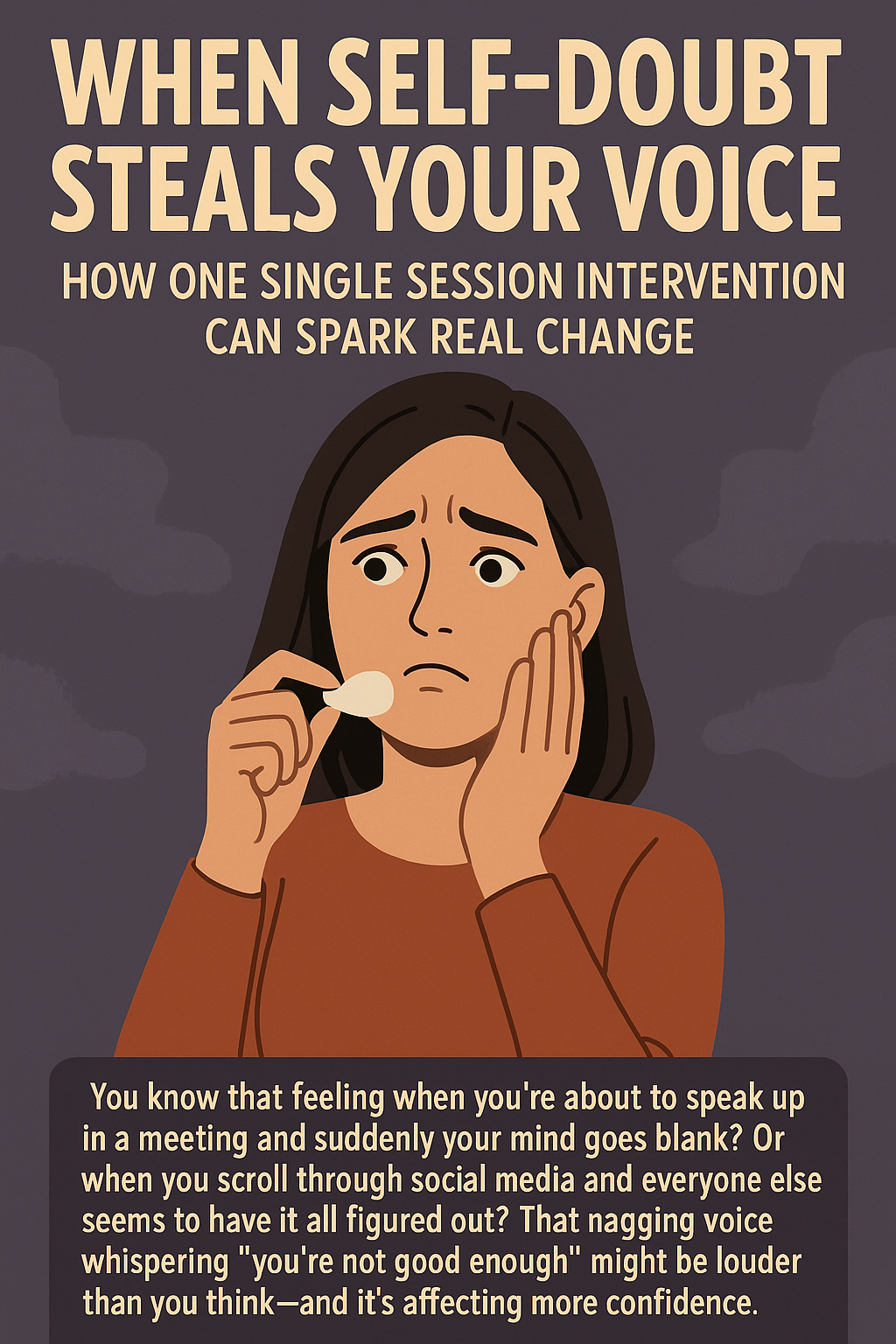Online Therapy for Self-Doubt and Low Self-Esteem

When Self-Doubt Steals Your Voice: How One Single Session Intervention Can Spark Real Change
You know that feeling when you're about to speak up in a meeting and suddenly your mind goes blank? Or when you scroll through social media and everyone else seems to have it all figured out? That nagging voice whispering "you're not good enough" might be louder than you think—and it's affecting more than just your confidence.
The Hidden Cost of Self-Doubt
Self-doubt doesn't just make you second-guess your outfit choice. It's the invisible force behind:
🔹 Freezing up during presentations, even when you know your stuff inside out
🔹 Avoiding opportunities because "someone else would do it better"
🔹 Overworking yourself to prove you deserve to be there
🔹 Staying silent when you have valuable ideas to share
🔹 Relationship strain from constantly seeking reassurance
Research shows that low self-esteem acts like a filter, distorting how we see ourselves and predicting everything from academic performance to relationship satisfaction. It's exhausting to live with a harsh inner critic as your constant companion.
Why Single Session Interventions Pack Such a Punch
Here's what might surprise you: meaningful change doesn't require months of therapy. Studies reveal that 83% of people report positive effects from just one focused session targeting their specific struggle.
Think of it like this—sometimes you don't need to renovate the entire house. You just need someone to show you which wall is load-bearing and which one you can knock down.
Single-session therapy works because it:
✅ Cuts through the noise to address what matters most right now
✅ Gives you tools you can use immediately, not someday
✅ Builds momentum by proving you can create change today
✅ Respects your time and current resources
The Three Moves That Matter Most
When tackling self-doubt in a single session therapy, evidence points to three game-changing strategies:
1️⃣ Values Alignment: Finding Your North Star
Instead of trying to convince yourself you're "good enough" (which your brain might reject), you identify what deeply matters to you. When your actions align with your values, confidence becomes a byproduct, not a prerequisite.
Quick example: If connection is your core value, speaking up in meetings shifts from "proving I'm smart" to "contributing to my team." The pressure dissolves when you're serving something bigger than your ego.
2️⃣ Strength-Focused Reframing: Flipping the Script
Your brain has a negativity bias—it's literally wired to spot threats and flaws. Single-session therapy work helps you deliberately hunt for evidence of your capabilities that your self-doubt has been hiding.
This isn't fake positivity. It's accurate accounting. You've been keeping incomplete books, only tracking your losses while ignoring your wins.
3️⃣ Micro-Behavior Experiments: Proof in the Pudding
Here's where rubber meets road. You design a tiny, specific experiment to test whether your self-doubt is telling the truth. These aren't huge leaps—they're calculated steps.
For instance: If you believe "I always sound stupid when I speak up," your experiment might be asking one clarifying question in tomorrow's meeting. Just one. Then you gather actual data instead of relying on fear's predictions.
Online Therapy - What Actually Happens in that 15 Minutes
Picture this: You start by naming the specific situation where self-doubt shows up strongest. Maybe it's networking events, dating, or creative projects. No need to unpack your entire history—just what's blocking you today.
Through guided questions, you discover patterns you hadn't noticed. Perhaps your "I'm not creative enough" story started when one middle school teacher criticized your art. Now it's running your adult life.
You leave with:
🔹 One reframe that immediately shifts how you see yourself
🔹 One tiny action you'll take within 24 hours
🔹 One way to track whether things are shifting
The Convenience Paradox
Here's something counterintuitive: making things slightly harder can build real resilience. Just like cooking one meal from scratch builds more life skills than ordering takeout forever, facing small challenges in a supportive framework strengthens your confidence muscle.
Single-session therapy introduces just enough friction—asking you to reflect, choose, and act—without overwhelming your system.
Your Move, Navigator
Remember: you're not broken and needing to be fixed. You're a capable person who's gotten tangled in an unhelpful story about yourself. Sometimes all it takes is one strategic conversation to help you see the exit door that was there all along.
What would change if you approached your self-doubt differently—starting today?
The research is clear: transformation doesn't require perfection or endless time. It requires one moment of clarity, one shift in perspective, one small brave action. That's the power of meeting yourself exactly where you are, with exactly what you need, exactly when you need it.
Your inner critic has had the microphone long enough. Maybe it's time to see what happens when you change the channel—even for just 15 minutes. 🎯
Start Now!
Online therapy where your next 15 minutes could change your next 15 years. Stop scrolling. Start transforming. One session. Real science. Lasting change.
Begin your breakthrough →
